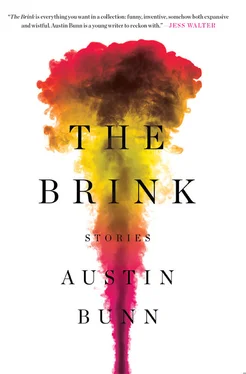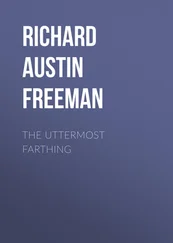He pulls back the blanket as if uncovering a body in a morgue. “How much for everything?” He is driving a fifty-thousand-dollar car and buying thirdhand baby furniture. I don’t press.
“I’ll take seventy-five,” I say.
“Done,” he says. On his way out with the stroller, he picks up the biggest shell in the basket. It’s a fan the size of a dinner plate and bleach white. “You giving these away?” he says.
I found that shell one night when Scott and I were fooling around under a pier. I had taken a black-and-white photography class — I wanted a hobby, it seemed validating — and we’d gone there to fill out my portfolio. Scott was high and determined to go down on me, but first I made him pose. Afterwards, I plucked the shell from the sand, an amateur naturalist. The photographs, though, were bad, dark, and indistinct.
“Sorry,” I say. “Keepsake.” Before, I was eager to give the shells away. But now I don’t want this man to have them.
He picks up a mottled brown and pink conch, flawless. “What about this one?” he asks, and I’m back in the tide, our first summer together, bonfire on the beach. “Look what I found,” I said to Scott, and he pulled me to him. “Look what I found,” he whispered, and squeezed my hips.
I don’t want these memories.
“Look, you can find all these shells on the beach,” I say.
“I don’t have time for the beach,” says the man with the convertible.
I won’t relent, and he shrugs. I help him with the stroller. It fits sideways, recklessly, in his passenger seat, ready to launch.
“It seems like you’re shedding,” he says.
“Shedding?” I say, irritated.
“You should call me,” he says. “I’m a therapist. I see things.” He jabs a business card out between two fingers.
I tell him I’m good, and he answers, “Suit yourself.”
My mother remains in the passenger seat, a heap of Coffee Nip wrappers in her lap. “He seemed like a hot prospect,” she says, his car revving out into the street.
“He just bought baby stuff off Craigslist,” I say. “Not a prospect.”
“Well, you sold it there,” she says.
My phone has four messages: two cancellations and two from Scott.
My mother and I buy burritos at the Quick Check and pick up her prescription at Walgreens, but the fact of the two items, the vaginal steroid and our food now in the same bag, erases my appetite. On her balcony, with its sweeping view of the parking lot, I watch her chew her carefully managed bites. My mother has one brave molar left. A heavy breeze brushes the plants and lifts our napkins.
“You need to call Al,” I say, fetching the phone. “He could be a vector.”
“You love me vulnerable,” she says. “It makes you feel whole.”
“I’m being cautious,” I say. “I’m being you .” How true and how awful that is. There must be a place in between parent and child, a way to take care of each other without resentment and hating yourself.
“Well, stop,” she says, and stands unsteadily. “Don’t be me. Nobody should be me.” She walks inside without her cane, lurching from one piece of furniture to another. One of the sad aspects of getting older, I think, is that you lose control over the quality of your entrances and exits. She sits on the couch, in the dark, and I hear her dial and leave a message for Al. A small happiness, the satisfaction of someone following instructions, rises in me.
“What happened?” I call to her.
“Leave me alone.”
“What? He’s not there?”
“He does his power walking on Saturdays,” she says. “Why don’t you go upstairs to happy hour, to the bar?” She wants to shower and apply her salve in private. I’m happy to leave and take the good magazines with me.
When the elevator door opens into the Penthouse Lounge, I feel as if I’m stepping onto the pleasure deck of a 1970s cruise ship, all aquamarine and pink extravagance, smelling vaguely of pizza dough and shrimp cocktail, the aroma of recent fun. I pull a chair to the floor-to-ceiling window. At this hour, the building’s shadow stretches way out into the Atlantic. Scott and I came up here just once, right after my mother moved in, and he pointed out the whole sweep, from the Palisades to the knobby tip of Long Island. He knew the geography. Below, Sandy Hook arcs out toward Manhattan. The people on it are just dots of color; maybe one is collecting shells, trying to hold the afternoon still. I could call Scott.
I should call Scott.
Living at the beach was his idea. I’d thought of other places for us — Philadelphia, Hoboken — but he wanted to sit at the beach in the sun and think and “see what surfaced.” Here I am, at the top floor, doing it without him. What we take from each other, without knowing. I remember Sundays, he’d prop his fishing pole up in the sand, park himself in a lawn chair, and stare out at the water, watching night come. Once, near the end, I showed him a perfect nautilus I’d found. He palmed it. “This used to be something’s house ,” he said with an emphasis that told me he was high, long after he’d promised to stop. “A house, until something died.” And I saw the curl of emptiness inside the shell and it was all I could see. All that armor protecting a darkness, really, an ending.
The elevator dings, and old men in baseball caps and windbreakers spill out. They discover me alone at the window and give me a wide berth. I’m probably some fantasy they’ve all had: the teary girl in the penthouse bar. They begin stretching on the floor, their legs up on tables, flexing. Not one has broken a sweat. It’s impossible to tell if they’re about to leave or are finishing up. I recognize Al in a yellow tracksuit and spotless white sneakers. His headphone-radio, a novelty of twenty years ago, loops around his neck. He smiles, and all I can see is complicated dentistry.
“You need to talk to my mother,” I say to him.
He looks concerned, almost as if he cared. “What’s the matter?”
“She’ll tell you about it.”
“Is she hurt?”
“She’s. . coping,” I say, righteous and inviolable. I am her daughter. I have her interests at heart.
“I’ll do that,” he says with chronic gentlemanliness. I smell a peppery gust of aftershave, cologne, and sweat. When he asks if I’m all right, I huff at him. He backs away, giving me my space, except now I don’t want it.
“Look, I just want you to take responsibility for your actions,” I call out. He’s bent over now, fingers about three feet from touching his toes. Al cranes himself out of position, his hands on his lower back, and comes back.
“Do you love her?” I ask. His eyebrows furrow.
“Your mother and I are good friends.”
“Friends with benefits?”
“Benefits?” he says, confused. “Like life insurance?”
The other men whisper to each other. The words boil out of me. “Oh, don’t play dumb. What is this place? Some kind of sex castle?” The others step toward the elevator. I know I look insane, but I’m right. If I’m not having sex, they’re not allowed to either.
Al sighs. “Your mother told me about you, what you’re going through.”
Of course she told him. She used me to get him. Because that’s what mothers do: they get us to run errands with them, wait patiently with cigarettes, take notes at the doctor’s. And then use our sadness as a story, as a friendship appetizer.
“You know something?” I say. “You’ve ruined her.”
Al shakes his head. “Grow up, sweetheart. Your pain’s driving this car.”
Which makes no sense! I grip the magazines into a tight coil and shake them at his nose like a dog. “Love is driving this car, asshole!”
Читать дальше











